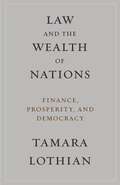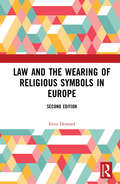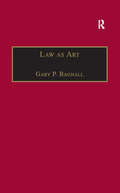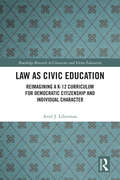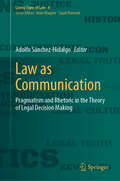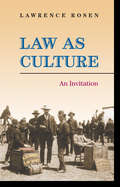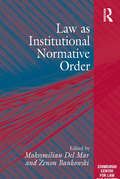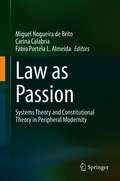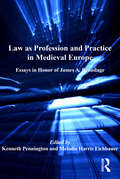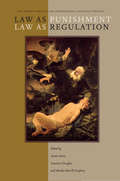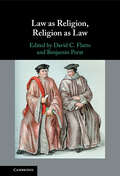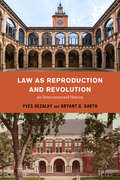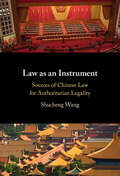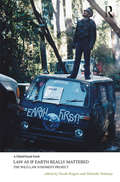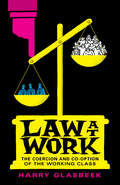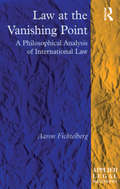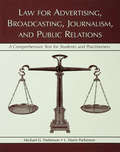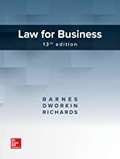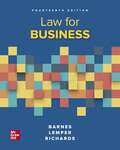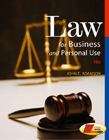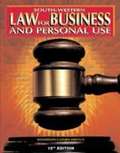- Table View
- List View
Law and the Wealth of Nations: Finance, Prosperity, and Democracy
by Tamara LothianEconomic stagnation, financial crisis, and increasing inequality have provoked worldwide debate about the reshaping of the market economy. But few are willing to risk a reorientation of dominant ideas and a reform of entrenched structures. Right-wing populism has stepped into the void created by a failure to imagine structural alternatives. Tamara Lothian offers a deeper view showing the path to the reconstruction of the economy in the service of both growth and inclusion. She probes the institutional innovations that would reignite economic growth by democratizing the market. Progressives have traditionally focused only on the demand side of the economy, abandoning the supply side to conservatives. Law and the Wealth of Nations offers a progressive approach to the supply side of the economy and proposes innovation in our fundamental economic arrangements.Lothian begins by exploring how finance can serve broad-based economic growth rather than serving only itself. She goes on to show how the reform of finance can lead into the democratization of the economy. How, she asks, can we ensure that the most advanced, knowledge-intensive practices of production spread throughout the economy rather than remaining in the hands of the entrepreneurial and technological elite? How can we anchor greater economic equality and empowerment in the way we organize the economy rather than just trying to diminish inequalities after the fact by progressive taxation and entitlements? How can we revise legal thought and economic theory to develop the intellectual equipment that these tasks require? Law and the Wealth of Nations will appeal to all who are searching for ways to think practically about change in our economic and political institutions.
Law and the Wearing of Religious Symbols in Europe
by Erica HowardWritten in accessible language, this book provides a comprehensive analysis of a topical subject that is being widely debated across Europe. The work presents an overview of emerging case law from the European Court of Human Rights and the Court of Justice of the European Union, as well as from national courts and equality bodies in European countries, on the wearing of religious symbols in public spaces. The author persuasively argues that bans on the wearing of religious symbols constitutes a breach of an individual’s human rights and contravene existing anti-discrimination legislation. Fully updated to take account of recent case law, this second edition has been expanded to consider bans in public spaces more generally, including employment, an area where some of the recent developments have taken place.
Law as Art (Applied Legal Philosophy #7)
by Gary P. BagnallLaw as Art presents a radical new legal theory, the Law as Art Hypothesis, which conceives law, not as a system of rules, but as a distinctive kind of art work. Law is differentiated as art by the Law as Compound Artistic Type Hypothesis, which uses the heuristic metaphor of the Operatic Music Drama, the most elementally complex compound art form, to develop an idea of legal art as a distinctive empowered text, supported by the arts of drama, painting, sculpture, dress-design, architecture, rhetoric and communication to form an elementally developed yet integrated unitary art work. Part I develops a new realist epistemology to support a contemporary action-type ontology of art, differentiated as art by virtue of its artistic value. Part II opens with a critical review of the arts in legal theory, before detailing the Law as Art and Law as Compound Artistic Type Hypothesis and locating them within contemporary scholarship. Legal philosophical implications are considered and there is an acronym key and glossary, bibliography and index.
Law as Civic Education: Reimagining a K-12 Curriculum for Democratic Citizenship and Individual Character (Routledge Research in Character and Virtue Education)
by Ariel LibermanIf a civic education is the essential foundation for a functioning, discursive democracy, how should it be taught? This book offers an innovative solution, arguing that far from abandoning the often- grand promise of civic education as a means of cultivating reasoning skills and democratic character, we should embrace it, and proposes a reimagined civic education based on teaching students in primary and secondary school law and legal reasoning.Drawing on a range of theoretical disciplines— law, philosophy, ethics, sociology, psychology, and moral educational and child development theory— this monograph justifies the benefits of law learning as a form of character and civic education and offers historical and comparative educational examples to show what is possible. It demonstrates how legal teaching can be incorporated into a K- 12 curriculum and argues that such training can be transformative, guiding students to become citizens capable of meeting the demands of democracy: citizens with stronger reasoning skills, a motivation to self- examine their values and beliefs and bring them into conversation with social values, and an ability to effectively navigate political institutions and participate in public discourse.This compelling and deeply original work will be of interest to scholars and educators in the fields of civic education, character and virtue education, legal studies, and philosophy of education.
Law as Communication: Pragmatism and Rhetoric in the Theory of Legal Decision Making (Living Signs of Law #6)
by Adolfo Sánchez-HidalgoThe Communicational Theory of Law (CTL) is a successful synthesis of the hermeneutic and analytical postulates, proceeding under the assumption that Law is the heritage of jurists and can be enriched by a rational and systematic reconstruction of the legal order. CTL offers an original perspective on the classic tension between normativity and institutionality, between Legal Theory and Legal Sociology, helping readers rediscover the value of Theory of Law in terms of explaining and advancing a range of legal functions. It wouldn&’t be saying too much to claim that through CTL, the contributions of the European philosophy of law from the 19th and 20th centuries (jurisprudence of concepts, legal sociology, legal positivism, institutionalism, etc.) can be reclaimed and now coordinated from a communicational and philosophy of language perspective, offering us a complete and useful Theory of Law. CTL does not avoid the problem of the idea of justice; rather, it confronts it by distinguishing between the Theory of Justice and ambital justice. As such, readers are equipped to verify the originality of the Theory of Legal Decision in the CTL framework and, thus, will find new tools for critically assessing the performance of courts and public authorities. This book details the epistemological presuppositions on which CTL is built, but also offers new lines of critical development, which reflect CTL&’s theoretical and philosophical potential. In the studies presented here, readers will find original answers to classic problems of the Theory of Law, together with examples of CTL&’s practical application to the great challenges of our time, such as interculturalism, legal AI, populist demagogy, the transparency of public powers, etc. – all without forgetting the challenges of the future of Law.
Law as Culture: An Invitation
by Lawrence RosenLaw is integral to culture, and culture to law. Often considered a distinctive domain with strange rules and stranger language, law is actually part of a culture's way of expressing its sense of the order of things. In Law as Culture, Lawrence Rosen invites readers to consider how the facts that are adduced in a legal forum connect to the ways in which facts are constructed in other areas of everyday life, how the processes of legal decision-making partake of the logic by which the culture as a whole is put together, and how courts, mediators, or social pressures fashion a sense of the world as consistent with common sense and social identity. While the book explores issues comparatively, in each instance it relates them to contemporary Western experience. The development of the jury and Continental legal proceedings thus becomes a story of the development of Western ideas of the person and time; African mediation techniques become tests for the style and success of similar efforts in America and Europe; the assertion that one's culture should be considered as an excuse for a crime becomes a challenge to the relation of cultural norms and cultural diversity. Throughout the book, the reader is invited to approach law afresh, as a realm that is integral to every culture and as a window into the nature of culture itself.
Law as Institutional Normative Order: Essays In Honour Of Sir Neil Maccormick (Edinburgh/glasgow Law And Society Ser.)
by Maksymilian Del MarMacCormick's `Institutions of Law' is the culmination of a lifetime's work in legal theory by one of the world's most respected legal theorists. Featuring an impressive collection of contributions from well-known legal theorists from around the world, all of whom are familiar with MacCormick’s work, this collection provides a cutting edge account of the book’s significance.
Law as Passion: Systems Theory and Constitutional Theory in Peripheral Modernity
by Miguel Nogueira de Brito Carina Calabria Fábio Portela L. AlmeidaInspired by the works of Professor Marcelo Neves, in this book colleagues come together to explore how their research has been influenced by non-European and post-colonial approaches. With a foreword by Karl-Heinz Ladeur, it features essays written by leading scholars in the fields of sociology of law and constitutional theory – including Hauke Brunkhorst, Darío Rodrígues, Kimmo Nuotio and Pablo Holmes.The content is divided into four sections, the first of which, “Law, State, and Global Crisis,” covers topics related to the modern constitutional state, the crisis of global capitalism, and the global rule of law. The second, “Symbolic Constitutionalization,” analyzes challenges to constitutionalism in the “Peripheral Modernity.” The authors in the third section examine how the concept of “Transconstitutionalism” can shed new light on contemporary debates concerning global public law. In turn, the last section of the book, “Systems Theory and Public Law,” addresses systems theory issues in the fields of legal history and administrative law.The book presents a relevant and original discussion encompassing such diverse fields as constitutional theory, international law, systems theory, and sociology of constitutions.
Law as Profession and Practice in Medieval Europe: Essays in Honor of James A. Brundage
by Kenneth Pennington Melodie Harris EichbauerThis volume brings together papers by a group of scholars, distinguished in their own right, in honour of James Brundage. The essays are organised into four sections, each corresponding to an important focus of Brundage's scholarly work. The first section explores the connection between the development of medieval legal and constitutional thought. Thomas Izbicki, Kenneth Pennington, and Charles Reid, Jr. explore various aspects of the jurisprudence of the Ius commune, while James Powell, Michael Gervers and Nicole Hamonic, Olivia Robinson, and Elizabeth Makowski examine how that jurisprudence was applied to various medieval institutions. Brian Tierney and James Muldoon conclude this section by demonstrating two important points: modern ideas of consent in the political sphere and fundamental principles of international law attributed to sixteenth century jurists like Hugo Grotius have deep roots in medieval jurisprudential thought. Patrick Zutshi, R. H. Helmholz, Peter Landau, Marjorie Chibnall, and Edward Peters have written essays that augment Brundage's work on the growth of the legal profession and how traces of a legal education began to emerge in many diverse arenas. The influence of legal thinking on marriage and sexuality was another aspect of Brundage's broad interests. In the third section Richard Kay, Charles Donahue, Jr., and Glenn Olsen explore the intersection of law and marriage and the interplay of legal thought on a central institution of Christian society. The contributions of Jonathan Riley-Smith and Robert Somerville in the fourth section round-out the volume and are devoted to Brundage's path-breaking work on medieval law and the crusading movement. The volume also includes a comprehensive bibliography of Brundage's work.
Law as Punishment / Law as Regulation
by Austin Sarat Lawrence Douglas Martha Merrill UmphreyLaw depends on various modes of classification. How an act or a person is classified may be crucial in determining the rights obtained, the procedures employed, and what understandings get attached to the act or person. Critiques of law often reveal how arbitrary its classificatory acts are, but no one doubts their power and consequence. This crucial new book considers the problem of law's physical control of persons and the ways in which this control illuminates competing visions of the law: as both a tool of regulation and an instrument of coercion or punishment. It examines various instances of punishment and regulation to illustrate points of overlap and difference between them, and captures the lived experience of the state's enterprise of subjecting human conduct to the governance of rules. Ultimately, the essays call into question the adequacy of a view of punishment and/or regulation that neglects the perspectives of those who are at the receiving end of these exercises of state power.
Law as Religion, Religion as Law
by Benjamin Porat David C. FlattoThe conventional approach to law and religion assumes that these are competing domains, which raises questions about the freedom of, and from, religion; alternate commitments of religion and human rights; and respective jurisdictions of civil and religious courts. This volume moves beyond this competitive paradigm to consider law and religion as overlapping and interrelated frameworks that structure the social order, arguing that law and religion share similar properties and have a symbiotic relationship. Moreover, many legal systems exhibit religious characteristics, informing their notions of authority, precedent, rituals and canonical texts, and most religions invoke legal concepts or terminology. The contributors address this blurring of law and religion in the contexts of political theology, secularism, church-state conflicts, and the foundational idea of divine law.
Law as Reproduction and Revolution: An Interconnected History
by Bryant G. GarthA free open access ebook is available upon publication. Learn more at www.luminosoa.org This sweeping book details the extent to which the legal revolution emanating from the US has transformed legal hierarchies of power across the globe, while also analyzing the conjoined global histories of law and social change from the Middle Ages to today. It examines the global proliferation of large corporate law firms—a US invention—along with US legal education approaches geared toward those corporate law firms. This neoliberal-inspired revolution attacks complacent legal oligarchies in the name of America-inspired modernism. Drawing on the combined histories of the legal profession, imperial transformations, and the enduring and conservative role of cosmopolitan elites at the top of legal hierarchies, the book details case studies in India, Hong Kong, South Korea, Japan, and China to explain how interconnected legal histories are stories of both revolution and reproduction. Theoretically and methodologically ambitious, it offers a wholly new approach to studying interrelated fields across time and geographies.
Law as an Instrument: Sources of Chinese Law for Authoritarian Legality
by Shucheng WangHow can the law be employed pragmatically to facilitate development and underpin illiberal principles? The case of contemporary China shows that the law plays an increasingly important role in the country's illiberal approach to both domestic and China-related global affairs, which has posed intellectual challenges in understanding it with reference to conventional, Western legal concepts and theories. This book provides a systematic exploration of the sources of Chinese law as pragmatically reconfigured in context, aiming to fill the gap between written and practised law. In combination with fieldwork investigations, it conceptualises various formal and informal laws, including the Constitution, congressional statutes, supreme court interpretations, judicial documents, guiding cases and judicial precedents. Moreover, it engages a theoretical analysis of legal instrumentalism, illuminating how and why the law works as an instrument for authoritarian legality in China, with international reflections on other comparable regimes.
Law as if Earth Really Mattered: The Wild Law Judgment Project (Law, Justice and Ecology)
by Nicole Rogers Michelle MaloneyThis book is a collection of judgments drawn from the innovative Wild Law Judgment Project. In participating in the Wild Law Judgment Project, which was inspired by various feminist judgment projects, contributors have creatively reinterpreted judicial decisions from an Earth-centred point of view by rewriting existing judgments, or creating fictional judgments, as wild law. Authors have confronted the specific challenges of aligning existing Western legal systems with Thomas Berry’s philosophy of Earth jurisprudence through judgment writing and rewriting. This book thus opens up judicial decision-making and the common law to critical scrutiny from a wild law or Earth-centred perspective. Based upon ecocentric rather than human-centred or anthropocentric principles, Earth jurisprudence poses a unique critical challenge to the dominant anthropocentric or human-centred focus and orientation of the common law. The authors interrogate the anthropocentric and property rights assumptions embedded in existing common law by placing Earth and the greater community of life at the centre of their rewritten and hypothetical judgments. Covering areas as diverse as tort law, intellectual property law, criminal law, environmental law, administrative law, international law, native title law and constitutional law, this unique collection provides a valuable tool for practitioners and students who are interested in learning more about the emerging ecological jurisprudence movement. It helps us to see more clearly what a new system of law might look like: one in which Earth really matters.
Law at Work: The Coercion and Co-option of the Working Class
by Harry GlasbeekIn a series of illuminating essays, the renowned Harry Glasbeek unpacks how law has been used to ensure that workers' aspirations are kept in check. Law at Work uncovers how the legal system, through its structures and mechanisms, legitimizes and reinforces the exploitation of workers. Using historic and contemporary examples, Glasbeek illustrates how conscious manipulations of law are part and parcel of how law protects capitalists at the expense of workers. He proves how the very laws designed to safeguard rights and freedoms often act as invisible shackles, compelling readers to reflect on their own struggles as they navigate a world where the legal system fails to serve their interests. These manipulations are made to look innocent because the underlying structures and ideology which give rise to specific rules are not challenged or challengeable. This thought-provoking book is an indispensable resource for those seeking to understand the hidden dynamics of worker oppression, empowering readers to question prevailing narratives and envision a future where the law truly serves the interests of all.
Law at the Vanishing Point: A Philosophical Analysis of International Law (Applied Legal Philosophy)
by Aaron FichtelbergTwo central questions are at the core of international legal theory: 'What is international law?', and 'Is international law really law?' This volume examines these critical questions and the philosophical foundations of modern international law using the tools of Anglo-American legal theory and western political thought. Engaging with both contemporary and historical legal theory and with an analysis of international law in action, the book builds an understanding and theory of law from the perspective of those who actually use this legal system and understand it, rather than constructing an artificial system from the standpoint of political scientists and moral philosophers. Law at the Vanishing Point provides a fascinating new challenge to those who reduce international law either to ethics or to politics and provides a critical new appraisal of its power as an independent force in human social relations.
Law for Advertising, Broadcasting, Journalism, and Public Relations: A Comprehensive Text For Students And Practitioners (Routledge Communication Series)
by Michael G. Parkinson L. Marie ParkinsonThis exceptional new text offers an up-to-date and integrated approach to communication law. Written by two practicing attorneys with extensive experience teaching the communication law course, Law for Advertising, Broadcasting, Journalism, and Public Relations covers the areas of communication law essential and most relevant for readers throughout the communication curriculum. Its integrated approach will serve students and practitioners in advertising and public relations as well as those in journalism and electronic media.Providing background to help readers understand legal concepts, this comprehensive communication law text includes an introduction to the legal system; covers legal procedures, structures, and jurisdictions; discusses the First Amendment and electronic media regulations; and considers issues of access. Additional material includes: *intellectual property law; *employment and agency law, with explanations of how these laws create obligations for mass communication professionals and their employees; *commercial communication laws; and *special laws and regulations that impact reporters, public relations practitioners, and advertisers who deal with stock sales.Special features of this text include:*Magic Words and Phrases--defining legal terms;*Cases--illustrating key points in each chapter;*Practice Notes--highlighting points of particular interest to professional media practices;*Instructions on finding and briefing cases, with a sample brief; and*Examples of legal documents and jury instructions.This text is intended as an introduction to communication law for students and practitioners in mass communication, journalism, advertising, broadcasting, telecommunications, and public relations.
Law for Business
by Eric L. Richards A. James Barnes Terry Morehead DworkinBusiness Law 10/e has provided students with a comprehensive, yet concise treatment of the legal issues of fundamental importance to business students and the business profession. The cases, which have always been a strong feature, are edited and re-written by the authors, who divide the material into three categories: facts, issues, decisions. The authors, Barnes, Dworkin, and Richards, choose cases that are appropriate to explain precedent and history as well as include “hot topic” cases that relate to current events. In addition to case applications, the authors use such techniques as content summaries to apply concepts to practice. Effective managers and employees must develop knowledge of both law and business because people involved in business also are involved in, and greatly affected by, the laws concerning business.
Law for Business
by Eric L. Richards A. James Barnes Timothy A. LemperA focus on readability and proven pedagogical devices ensures Law for Business is a student-friendly perspective that will aid students in their comprehension and critical analysis of often complex topics in business law. It’s comprehensive, yet concise approach is appealing to both students and instructors alike giving instructors flexibility and students the ability to understand the fundamental importance of how legal issues impact decision making in business.
Law for Business
by John E. Adamson Edward J. Conry Norbert J. MietusThis text effectively teaches an understanding of legal obligations and rights in business, and how to avoid legal difficulties. Law For Business effectively covers areas such as computer law, financial crimes, legal careers, environmental law, international law, and more.
Law for Business and Personal Use
by John E. Adamson Amanda MorrisonLAW FOR BUSINES AND PERSONAL USE, 19E provides instruction on the foundations of business law as well as the application of legal concepts to everyday life.
Law for Business and Personal Use
by John E. AdamsonAdamson (business, Southwest Missouri State University) outlines the U. S. legal system and explains how various laws apply to the rights and duties of small businesses. The 32 chapters discuss civil procedure, contract law, leasing of real property, wills and trusts, employment law, legal forms of business organization, and financial transactions. Annotation ©2006 Book News, Inc. , Portland, OR (booknews. com)
Law for Business and Personal Use
by John E. Adamson Norbert J. MietusThis 15th edition of Law for Business and Personal Use maintains a fundamental emphasis on business law, while introducing personal law topics that interest students. Give your students the most comprehensive coverage of contracts, ethics, employment law, credit, banking, partnerships, bankruptcy, etc.
Law for Business and Personal Use
by John E. AdamsonAdamson (business, Southwest Missouri State University) outlines the U. S. legal system and explains how various laws apply to the rights and duties of small businesses. The 32 chapters discuss civil procedure, contract law, leasing of real property, wills and trusts, employment law, legal forms of business organization, and financial transactions. Annotation ©2006 Book News, Inc. , Portland, OR (booknews. com)
